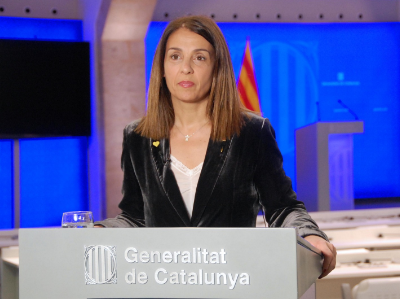- Minister Budó called for opposition groups to back the Government of Catalonia’s budget in a vote in Parliament to be held tomorrow and urged state and EU institutions to develop an ambitious economic recovery plan
- Minister Vergés said over 29,000 PCR test have been performed in care homes for the elderly

The Catalan government welcomed a change of tone from Spanish Prime Minister Pedro Sánchez, who, speaking in the Congress of Deputies yesterday, called for regional authorities to work together with the central government in the reconstruction process that will need to take place in the wake of the coronavirus health crisis. The Minister of the Presidency and government spokesperson, Meritxell Budó, welcomed the fact that the PM had “changed course and proposed that different solutions be pursued according to the needs of each territory,” an approach the Catalan government has been advocating for weeks.
Budó said: “We offer the Spanish government our collaboration and support to fight this pandemic together. But we’re asking them to listen to us. We’re calling for collaboration rather than imposition and a one-size-fits-all approach to decision-making [because] it’s regional governments that best understand the specific circumstances of each town and city and are therefore best equipped to manage the response to this crisis.”
The minister said the executive will present the Government of Catalonia’s 2020 budget to Parliament tomorrow. The accounts will be approved by an absolute majority vote following negotiations by the executive to secure the support of the Catalunya en Comú Podem (Catalonia in Common–We Can) parliamentary group. Budó called on other opposition political groups to back the budget.
The new budget will provide the Catalan government with more resources to tackle the crisis, but the spokesperson warned that more needs to be done. She urged central government and EU institutions “to develop a broad economic recovery plan that includes the modification of current deficit and expenditure ceilings,” arguing that in this crisis the priority should be to help “companies, entrepreneurs, the self-employed and people”.
The Government of Catalonia’s 2020 budget envisages a €3bn increase in non-financial expenditure that is not earmarked for specific purposes, and the investment capacity of the Catalan public sector will be 25% higher (€2bn in total). Budó said that once the budget has been approved it will be possible to reassign resources and define new priorities in order to tackle the health emergency and economic crisis. The Catalan government has estimated that healthcare expenditure will increase by at least €1.8bn as a result of the coronavirus outbreak.
Update from the Catalan Minister of Home Affairs, Miquel Buch
- The Mossos (Catalan police) continue to take measures to strictly enforce the lockdown.
- Minister Buch thanked hauliers for their role in maintaining basic services and ensuring the availability of food products in shops.
- Lockdown exit plan. General instructions will be issued based on the epidemiological data for Catalonia. Each municipality will then be able to tailor the measures to local circumstances.
Update from the Catalan Minister of Health, Alba Vergés
- 29,455 PCR test have been performed in care homes for the elderly, and 590 individuals have returned to family residences. 743 residents have been relocated so that they can be provided with better care.
- The Catalan Ministry of Health has distributed an additional 470,000 units of personal protection equipment this week.
- 66% of critical-care beds are currently being used for Covid-19 patients. (Critical-care capacity has been tripled since the start of the crisis.)
- “We need to closely monitor the dynamics of the epidemic to avoid resurgences that would put a strain on critical-care resources. […] We must do everything possible to avoid jeopardising the progress we’ve made, which has taken a huge effort.”
- For the first time since 25 March, the number of Covid-19 patients in critical-care beds has fallen below a thousand.
- Nearly 200,000 PCR tests have been performed across Catalonia. These tests are important to understand the dynamics of the epidemic and generate precise epidemiological data to guide decision-making in the coming days.
- The Catalan Ministry of Health will work with economic and social actors to make detection tests available for non-priority groups.